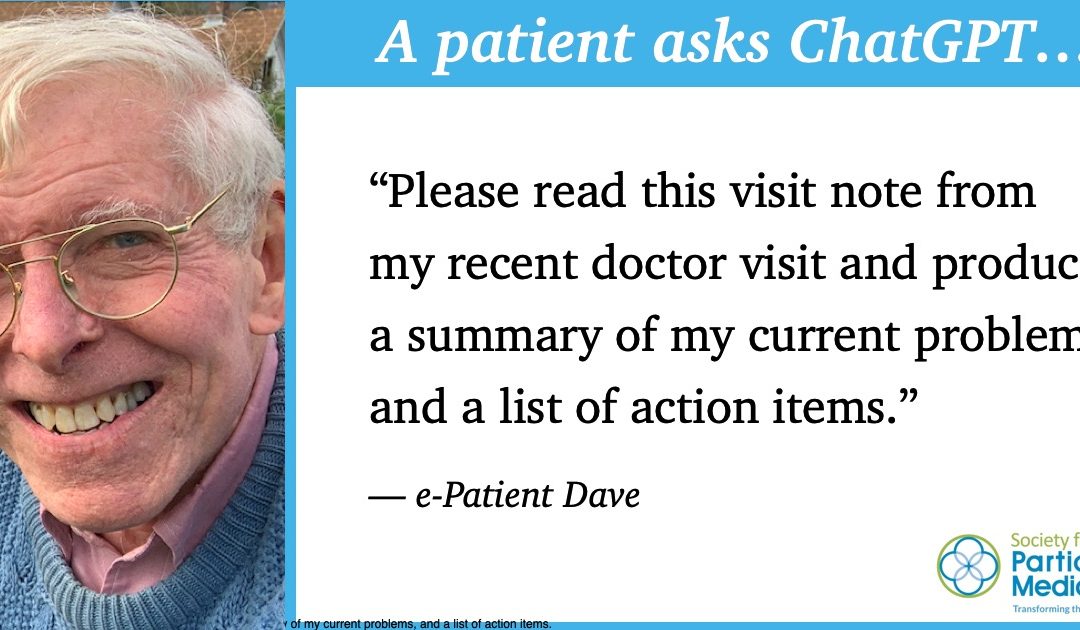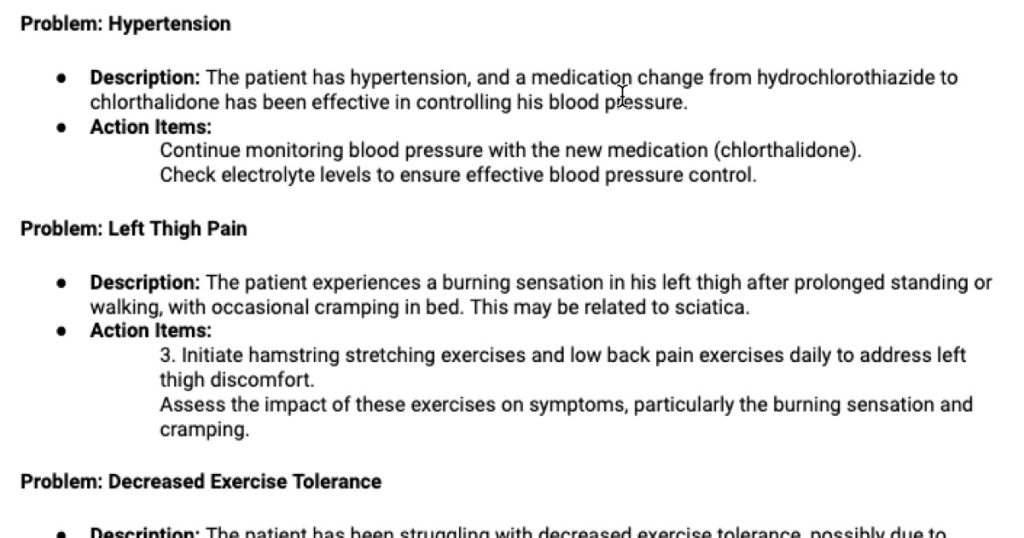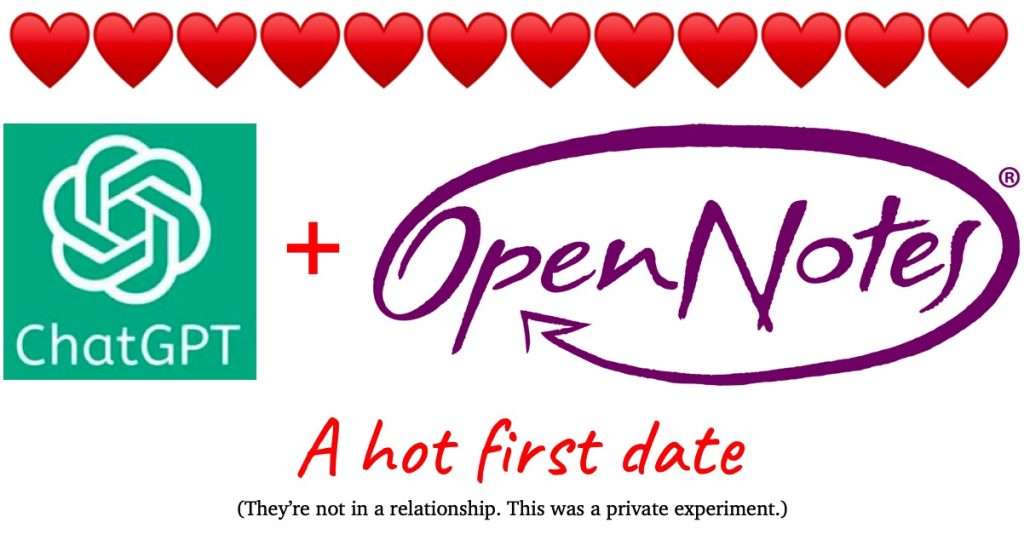I had an idea last week and just tried it. ChatGPT is awesome at summarizing things, but could it handle medical notes? They’re complicated.
It worked! I took the visit notes from my last doctor appointment (the whole big, long, detailed thing) and asked ChatGPT 3.5 to summarize my takeaways. Boom! After a couple of tries, look what I got. That link shows the whole summary of issues and actions; here’s an excerpt. It’s organized and summarized!
Does your doctor’s note look like that? If so, great, and let us know where you get it! Mine doesn’t, as the link above shows.
This isn’t perfect but it’s an awesome simplifier.
It got a number of things somewhat wrong, but it sure simplified everything for me! Before I bet my life on any of it I’d review the original messy details. But it sure helps me see the big picture without having to schedule a chunk of my day to digest it all. And that’s important – because big projects are less likely to get done.
Here’s my initial exchange with ChatGPT: (I haven’t tried it yet with other AIs like Bard, Claude.AI etc)
Prompt: Please read this visit note from my recent doctor visit and produce a summary of my current problems, and a list of action items.
ChatGPT: I’d be happy to help you summarize the visit note and list the action items. Please provide the content of the visit note or the key information from it, and I’ll assist you in generating the summary and action items based on that information.
The first result was great but it gave me ideas how it could be better, so I asked it for a couple of tweaks. (If you haven’t tried ChatGPT, you should know, if its first answer isn’t great you don’t have to start over – you can ask it to adjust what it just did.) In making suggestions I didn’t know what I was doing – heck, this was just an experiment. So I adjusted several more times:
Please reorganize that so each action item is listed along with the problem that it addresses.
Please produce the list sorted by problem, with the description of each problem followed by its action items.
That response did not include the description of each problem as requested. Please fix that.
On the last one it replied, “Apologies for the oversight.” :-)
The whole session is pasted into the Google Doc link at top of this post.
We told you so.
This Society has been avid supporters of the OpenNotes movement since 2010 – literally the start of the first clinical trial. That project led eventually to Federal policy saying that you can see, online, everything they wrote about you: the notes are open to you. Last week I tweeted about it with Liz Salmi of OpenNotes, and she said she’d done it last year. (No surprise, she’s also a member of SPM.)
Even before that, this Society was formed in 2009, calling for medicine to be a partnership between clinicians and e-patients”: Empowered, Engaged, Equipped, Enabled. We’ve called for patients to have access to their data, and we’ve predicted that is technology evolves the power of mash-ups would allow motivated patients to do unexpected things just because they want to. This has been the vision of our “patron saint,” “Doc Tom” Ferguson, dating back to the 1970s when he published “Medical Self-Care” magazine. (See our Doc Tom page for more about him.)
Do you want to do this? Maybe, maybe not.
This experiment wasn’t hard to do – you only need an account on ChatGPT or something similar, and you need to copy/paste (or download) your visit note from your patient portal so you can paste it into the A.I.
BUT: do you WANT to feed it your private medical info? Tools like this keep a copy of what you upload, as part of their ongoing training. For me personally this isn’t a concern – I call myself a health data nudist. (“I don’t care who sees what.”) But many people have good reason to not let their privates get out in the wild. So think before you A.I. (Or maybe delete some parts before you upload … you’re only doing it for your own convenience.)
The HIPAA privacy rule does not protect things like this. Once you take your data out of the doctor’s system, it’s no longer their responsibility.
Join SPM in this movement.
Now that these tools are coming rapidly over the hill, we plan to be advocating and evangelizing things like this – spreading the word and letting the world know how empowering stuff like this is, and how much it alters the power structure in the patient-clinician dyad. How do we practice healthcare differently in this era?? Let’s work it out! Join us, as an individual or an organization.









Nicely done, Dave. A real contribution.
In a recent review of the EHR through my primary care’s patient portal, I found a list of diagnoses, which seemed the most critical information that I would need to pass on to my new doctor. Much to my surprise, I had been ‘diagnosed’ with a mix of conditions, handily listed in alphabetical order. The lists began with “Atherosclerosis of artieres of the extremities, Benign essential hypertension, Covid-19, Exposure to SARS-CoV-2, Mixed hyperlipidemia, Prediabetes, Fatigue, Long-term Drug Therapy, Migraine”, but nothing was in the last half of the alphabet.
I didn’t know I was such a mess, and certainly had received no advice or treatments to counter my many ailments…
A quick call to ask for an explaination of this (I can only cop to this as to “Anxiety” about the list) was fruitless. Days and days and many messages later, I was told that this was ‘just so we could bill your insurance.”
In my health history, there is no reference to my Stage IV kidney cancer, for which I am monitored annually, nor my Stage II breast cancer and its treatment. Now I live elsewhere and want to find a new primary care doctor. I will NEVER permit this incomplete, erroneous EHR into any health system!
PS. This EHR was apparently developed by “Patient Fusion”. I suggest it be renamed “Patient Confusion/Physician Delusion”.
?!?! I’ve long known there were abuses for bogus insurance charges, but I’ve never heard of a practice coming right out and SAYING it!
But is this the fault of the vendor (Practice Fusion) or the user??
Did you ask your PCP, vs the office staff?? And I wonder what your insurer thinks about this. Sounds like insurance billing fraud to me!